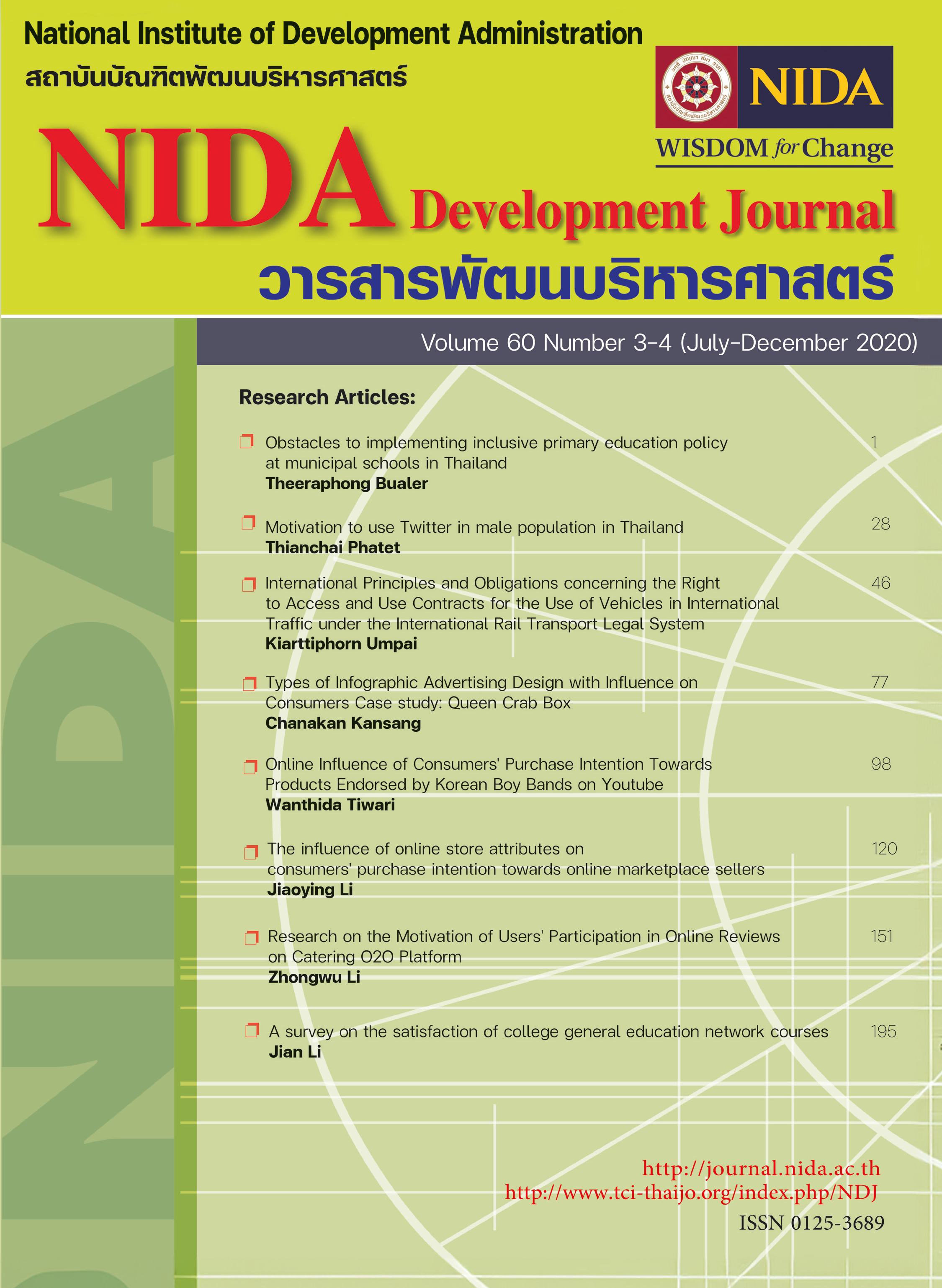Motivation to Use Twitter in Male Population in Thailand
Keywords:
Twitter, Trust, Online games, Spam and DuplicateAbstract
The objective of this independent study is to study Motivation to use Twitter in male population in Thailand. The results of the study will help to understand the Twitter usage behavior of the male population in Thailand. This research is a quantitative research. The sample was 400 male population in Thailand and an online questionnaire was used as a tool for data collection.
The results of the study showed that the variable most influencing motivation is Trust of the information. Second is Facilitating Condition. Third place is Performance Expectancy. The fourth is Spam and Duplicate. Fifth place is Meeting new people. The sixth place has online game. Seventh place is Anonymous. And the final is Effort Expectancy
References
Akar, Mardikyan (2014). Analyzing Factors Affecting Users’ Behavior Intention to Use Social Media: Twitter Case. Management Information Systems Department Bogazici University Hisar Campus Istanbul.
Alrajehi (2016). Twitter Uses and Gratifications of High School Students. Kuwait University Communication.
Bolton (2013). Understanding generation Y and their use of social media: A review and research agenda.
Brannen (2010). Motivational use of twitter: Master of art university of Missouri-Columbia.
Cheung, C., L. (2011). Online social networks: Why do students use Facebook?. Department of Finance and Decision
Sciences: Hong Kong Baptist University.
Dogruer, M., E. (2011). What is the motivation for using Facebook?. Eastern Mediterranean University, Famagusta, North
Cyprus.
Erz, M., & O., (2000). Hashtags: Motivational Drivers, their Use, and Differences between Influencers and Followers.
ETDA. (2019). Internet User Behavior Survey Report in Thailand 2019: Bureau of Strategy, Development Agency. Electronic Transactions, Ministry of Digital Economy and Society.
Hossain (2019). Effects of uses and gratifications on social media use: The Facebook case with multiple mediator analysis.
Karimi, K., E., & A. (2014). Applying the Uses and Gratifications Theory to Compare Higher Education Students’ Motivation
for Using Social Networking Sites: Experiences from Iran, Malaysia, United Kingdom, and South Africa. CONTEMPORARY EDUCATIONAL TECHNOLOGY, 2014, 5(1), 53-72.
Kemp (2020). Digital 2020: Global Digital overview. https://datareportal.com/reports/digital-2020-global-digital-overview
Kircaburun (2016). Effects of Gender and Personality Differences on Twitter Addiction among Turkish Undergraduates.
Duzce University, Faculty of Education, Computer Education and Instructional Technology. Journal of Education
and Practice.
Mazman, Kocak (2011). Gender differences in using social network. Hacettepe University, Faculty of Education.
Pimpan (2016). Factors Affecting the Acceptance and Use of PromptPay Services: Management Information Systems Program. Faculty of Commerce and Accountancy, Thammasat University.
Shu, S., W,. T., & L. (2017). Fake News Detection on Social Media: A Data Mining Perspective. Computers in Human Behavior The university of Edinburgh.
Suki, S. (2017). Determining students’ behavioural intention to use animation and storytelling applying the UTAUT model: The moderating roles of gender and experience level. Faculty of Computing and Informatics, Universiti Malaysia Sabah, Malaysia.
Thomas, G., P., & S. (2011). Suspended Accounts in Retrospect: An Analysis of Twitter Spam.
Toll (2019). The Uses and Gratifications of Facebook Among Swedish University Students. Department of Information Systems and Technology.
Usana, Woraphan (2008). Testing of usability in internal auditing: a case study of system program testing. Project Management: Department of Accounting, Faculty of Business Administration Kasetsart University.
Wang (2010). Do not follow me: Spam detection in twitter. College of Information Sciences and Technology, The Pennsylvania State University.
Weiser, M.Sc. (2000). Gender Differences in Internet Use Patterns and Internet Application Preferences: A Two-Sample
Comparison. Department of Psychology, Texas Tech University.
Wimonphan, S., Chor. (2013). Communication Behavior on Facebook of Rajamangala University of Technology Phra Nakhon Students. Rajamangala University of Technology Phra Nakhon.
Downloads
Published
How to Cite
Issue
Section
License
Copyright (c) 2023 NIDA Development Journal

This work is licensed under a Creative Commons Attribution-NonCommercial-NoDerivatives 4.0 International License.





